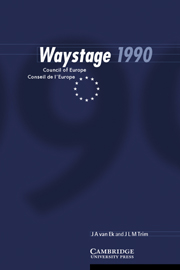Book contents
- Frontmatter
- Contents
- Preface
- Introduction
- 1 The objective: description
- 2 Components of the specification
- 3 Language functions
- 4 General notions
- 5 Themes and specific notions
- 6 Dealing with texts: reading and listening
- 7 Writing
- 8 Sociocultural competence
- 9 Verbal exchange patterns
- 10 Compensation strategies
- 11 Learning to learn
- 12 Degree of skill
- APPENDICES
5 - Themes and specific notions
Published online by Cambridge University Press: 01 March 2010
- Frontmatter
- Contents
- Preface
- Introduction
- 1 The objective: description
- 2 Components of the specification
- 3 Language functions
- 4 General notions
- 5 Themes and specific notions
- 6 Dealing with texts: reading and listening
- 7 Writing
- 8 Sociocultural competence
- 9 Verbal exchange patterns
- 10 Compensation strategies
- 11 Learning to learn
- 12 Degree of skill
- APPENDICES
Summary
Introduction
Learners who can fulfil the language functions and deal with the general notions listed in Chapters 3 and 4 have a basic potential for using the foreign language for a variety of purposes in a variety of situations. In which situations and for which purposes they can actually do this depends to a large extent on their ability to handle the more specific vocabulary related to particular topics. In the corresponding chapter in Threshold 1990 (Chapter 7) we listed those themes and specific notions that the learners would be most likely to need to be able to cope with. Since the target group for Waystage is substantially the same as that for Threshold there is no reason to assume that their needs would be different in this respect. The only difference, in principle, is that at Waystage learners will have invested considerably less learning time than at Threshold. This will inevitably mean that their sphere of action in the foreign language is more restricted than at Threshold. Whereas at Threshold learners may be expected to be able to deal with a variety of matters not only in relation to their own individual situation but also in a more generalised, impersonal and occasionally even abstract way, Waystage will be largely confined to the personal and the concrete. However, this difference will hardly enable us to effect a considerable reduction in the number of themes and sub-themes selected for Threshold.
- Type
- Chapter
- Information
- Waystage 1990Council of Europe Conseil de l'Europe, pp. 30 - 41Publisher: Cambridge University PressPrint publication year: 1999



